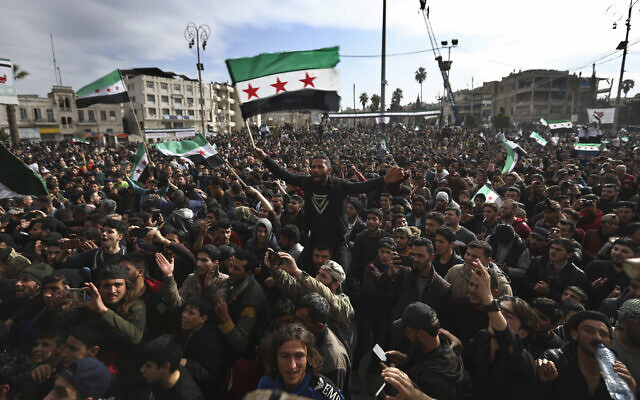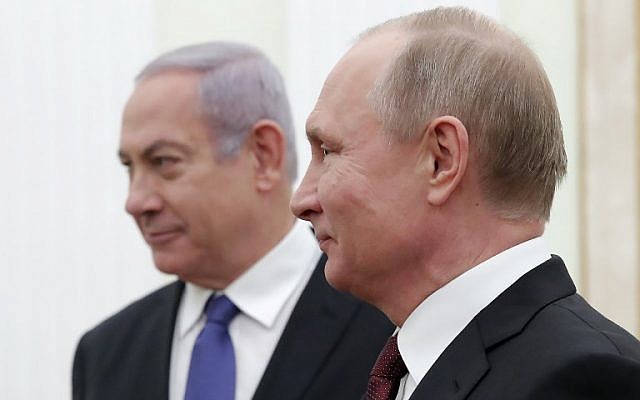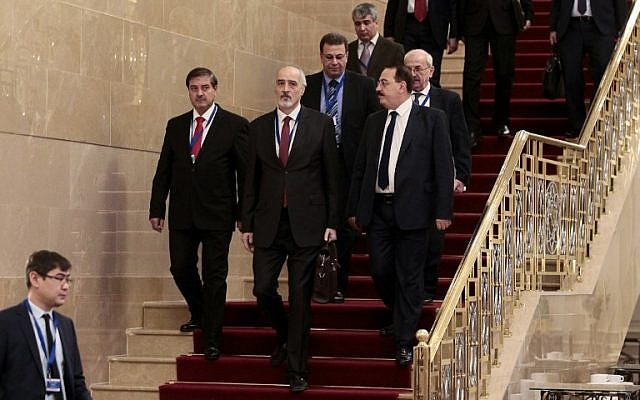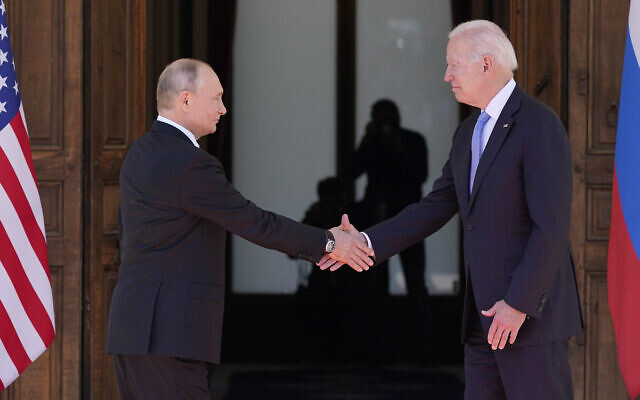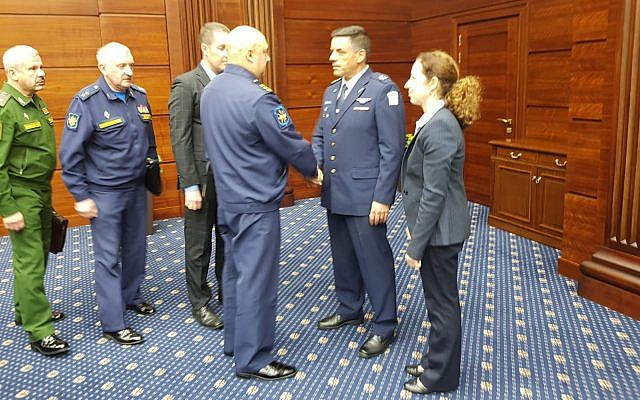
Despite a report saying Biden gave Putin an implicit go-ahead to confront IAF strikes more forcefully, Moscow doesn’t appear to be doing much more than sending anonymous signals.
A narrative has emerged over the past week that Russia is fed up with Israel’s ongoing aerial campaign in Syria, and is moving to change the rules of the game there to Israel’s detriment.
The speculation took off in the wake of a report on Saturday by Asharq Al-Awsat. The London-based Arabic daily cited a “well-informed” Russian source who said that in June talks between US President Joe Biden and Russian President Vladimir Putin, the Kremlin received the impression that “Washington does not welcome the continuous Israeli raids,” and believes Moscow can act more aggressively to foil them.
According to the unnamed source, the Russians are now supplying Syrian forces with more advanced anti-missile systems and knowhow, rendering them more effective at countering Israeli raids.
Seven of the eight missiles fired by Israeli jets on July 19 were intercepted by Syrian-operated Russian air defense systems, according to Rear Admiral Vadim Kulit, the deputy chief of the Russian Center for Reconciliation of the Opposing Parties in Syria.
The following day,Kulit referenced two other Israeli attacks that week, including strikes by IDF F-16s in the Homs province. “All four missiles were destroyed by the Syrian duty air defense facilities, with the use of Buk-2ME systems of Russian manufacture,” Kulit claimed.
Russia is frustrated with Israel ignoring the “rules of the game” Moscow seeks to lay down in Syria and the US gave the Russians an implicit nod to operate more aggressively against Israel, Asharq Al-Awsat reported.
But the report stretches credulity in many ways, and the latest Russian statements should be seen as part of years-long tensions and messaging between Jerusalem and Moscow over Syria.
In late 2010 and early 2011, the Arab world experienced a series of convulsions that tore apart the Middle East as we knew it. Starting in Tunisia, where a young fruit vendor named Mohamed Bouazizi set himself on fire to protest corruption and police abuse, angry demonstrations spread throughout the region. Some of the world’s longest-ruling leaders were toppled within months.
Those protests reached Syria in March 2011, with tens of thousands taking to the streets to demand government reforms and civil rights. The demonstrations quickly turned into a full-blown armed uprising against the Bashar Assad regime.
By 2013, Israel understood that the civil war in Syria offered an opportunity. The fraying Syrian army meant that Israel enjoyed unprecedented freedom of action in the country to fight against Iranian entrenchment and Hezbollah’s military buildup there.
The IDF effort that emerged from that understanding was called the “campaign between wars,” or Mabam in its Hebrew acronym.
Israel ramped up its attacks as time went on. In 2018, Israel accused Iran of firing 20 rockets from Syria at IDF positions, the first time Israel had directly accused Tehran of firing at Israel. According to Israeli officials, IAF planes retaliated in a massive operation by striking logistics and intelligence sites used by Iranian forces in Syria.
Per the UK-based Syrian Observatory for Human Rights, Israeli strikes killed 113 Iranian soldiers and allied militiamen in a one-month period in 2018. The IDF said it struck over 200 Iranian targets in Syria that year.
Despite the Israeli campaign, Iran has continued to push ahead with its efforts to establish a bridgehead on Israel’s northern border to threaten the Jewish state and has advanced plans for a range of attacks, according to the IDF.
In January 2015, an IAF strike targeted the leaders of what Israel said was a substantial new Hezbollah terror hierarchy that was set to attempt kidnappings, rocket attacks and other assaults on military and civilian targets in northern Israel.
In recent years, Iran has also attempted to send attack drones into Israel. In August 2019, the military said it carried out bombing runs to thwart an Iranian Revolutionary Guard Corps plot involving what were described as “kamikaze” attack UAVs.
Each Israeli strike, though, carries risks of inviting reprisal attacks or snowballing into a larger conflagration. Making the theater even more perilous from an Israeli perspective is the fact that Russia too has attempted to exploit the chaos for its own gains.
In 2015, Russia moved forces to Syria to ensure Assad’s survival. Israel had to flex its muscles to establish clear red lines that the Russians would understand, and it turned to an Arab security partner to do so. According to Jordan’s King Abdullah,Israeli and Jordanian jets together confronted Russian warplanes over southern Syria and warned them away from crossing their shared border in January 2016.
Israel and Russia established a so-called deconfliction mechanism to keep the sides from getting tangled up, and then-prime minister Benjamin Netanyahu met Putin on multiple occasions to discuss the issue.
Israeli officials do not generally discuss the full extent of that coordination, but they stress that the IDF does not seek Russian permission before carrying out operations. At the same time, though, Israel’s freedom of action was seriously curtailed, especially after Russia provided advanced S-300 air defense batteries to Syria following an incident in which a Syrian gunner, aiming for Israeli jets, knocked a Russian plane out of the sky instead, killing all 15 people on board.
It is clear that Iran is not about to stop sending Iranian troops and proxy militias to Syria. At the same time, Israel has shown a firm resolve not to let that happen, and has demonstrated that its intelligence and operational capabilities give it a distinct advantage over Iran in Syria.
Russia as well is there to stay, along with its advanced air defense systems that could threaten Israel’s dominance in the skies over Syria. “Our freedom of action is in the hands of the Russians,” argued Mitvim Institute fellow Ksenia Svetlova. “It’s not a Syrian-Israeli issue anymore. It’s a Syrian-Russian-Israeli issue.”
A possible message
It’s no secret that Russia is not happy with Israeli strikes in Syria.
In a joint summary statement by Russia, Turkey, and Iran after the 16th Astana conference earlier this month, the three parties “condemned continuing Israeli military attacks in Syria which violate the international law, international humanitarian law, the sovereignty of Syria and neighboring countries, endanger the stability and security in the region.”
Addressing the matter during a January visit to Jerusalem, Russian Foreign Minister Sergey Lavrov said, “If Israel is really forced to respond to threats to Israeli security coming from the Syrian territory, we have told our Israeli colleagues many times: if you see such threats, please give us the information.”
But that longstanding Russian position is no reason to buy into the idea that the rules in Syria are about to change drastically.
“We can’t rule out the fact that they [Asharq Al-Awsat] received messages from the Russians to publish,” said Zvi Magen, Israel’s former ambassador to Russia and senior fellow at the Institute for National Security Studies in Tel Aviv. “The question is who the source is.”
Without knowing anything about the sole unnamed source, there is no reason to accept the piece’s argument of a drastic change in policy.
No one she has spoken to in Russia believed that the source is from Russia’s foreign or defense ministry, said Svetlova.
Moreover, the Russians are not publicly standing behind the report.
In addition, the Biden administration, which has hinted at displeasure with Israel over other issues — including over violence in Jerusalem and the May Gaza conflict — hasn’t signaled anything of the sort that the Asharq Al-Awsat claimed. In fact, the US even coordinated with Israel on a strike in Syria in February.
Still, there is the possibility that Russia is sending a message with its claims of successful interceptions and leaks to the media.
With an Iran nuclear deal possibly approaching, and the subsequent improved ties between Tehran and the West, the Russians might be signaling to the Iranians that they are their most reliable interlocutors in the Middle East and that Russia will support them against Israeli attacks.
“The Iranians are not Russia’s friends, they’re partners,” Svetlova stressed.
“We’re not partners,” she said, referring to Israel.
The messages about successful interceptions of Israeli missiles might be a different type of signal. The MAKS-2021 International Aviation and Space Salon took place near Moscow over the same period as the Israeli strikes in Syria.
As Russia continues to try to promote its weapon systems as a preferable alternative to American-made systems — even to US partners like Egypt and Turkey — claiming that its air defenses foiled the IAF in Syria could alleviate concerns about their effectiveness.
Russia could be playing a bit of diplomatic chess as well. Its focus on information warfare is no secret, and sensing some daylight between the Biden and Bennett administrations, Moscow might be working to make waves in the US-Israel relationship through the media.
At the same time, with the new Bennett-Lapid government getting comfortable after 12 years of Netanyahu, Moscow might be testing how firm Israel’s new leadership is, and whether it can be intimidated into making concessions in Syria.
There is no question that Kulit’s statement last week was a departure from the usual technical briefings, and that the focus on Israel signified some type of message. But that message doesn’t necessarily have to come from the highest levels of Russia’s leadership. There may well be a faction within Russia’s military that is opposed to coordination with Israel and asserted itself last week.
Keep calm
Russia’s posture toward Israel in Syria bears watching, but there is no reason for panic.
Bilateral relations are generally good. Still, they are affected by developments on the international stage, especially in the Middle East.
“Nothing, as far as I know, has changed,” said the INSS’s Magen. “All the talk of interceptions is not new… Nowhere did they say that Russia is changing its fundamental approach to Israel.”
Moreover, Russia cannot force Israel to stop its strikes through military means. It has tried to clip Israel’s wings in Syria by warnings and diplomacy, but if Israel is determined to act, Russia is powerless to stop it.
“At the same time, if I look at everything together, I see a string of hints that together create a message…maybe,” said Magen. “If [that’s the case], we have to treat it a little more seriously, because even though it’s clumsy, it’s a Russian message to Israel.”
“I recommend that Israel doesn’t give in and doesn’t blink,” he concluded.
(Times of Israel).

